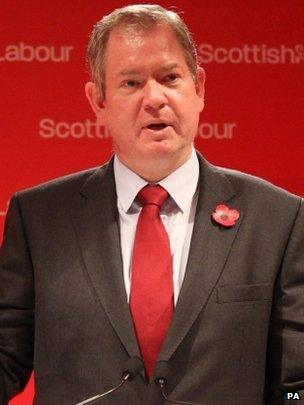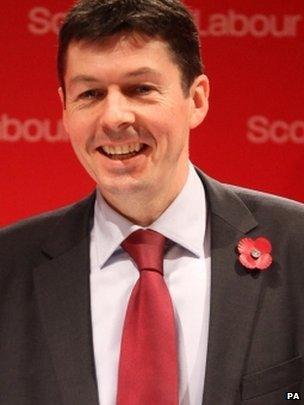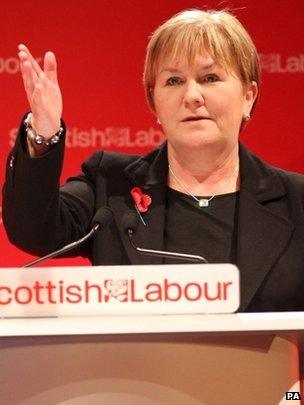Who were the Scottish Labour leadership candidates?
- Published
Scottish Labour has elected a new leader - Johann Lamont - following Iain Gray's decision to stand down from the role in the wake of the SNP's landslide election win.
Here is a look at the candidates who wanted to replace him.
Tom Harris
The fact that the first person to declare an interest in the leadership wasn't even an MSP goes, in many ways, right to the heart of what this contest is about.

And even though the rules have been specially changed to allow MPs and MEPs to lead the Scottish party, Tom Harris is not currently the frontrunner.
Since being first elected in 2001, the Glasgow South MP - the author of a political book entitled Why I'm Right . . . And Everyone Else is Wrong - has seldom been afraid of speaking his mind.
He was the first Scottish MP to call on Gordon Brown to quit as prime minister.
With Iain Gray initially deciding to stand down in September, Mr Harris said, at the start, that the lack of interested candidates for Scottish leader was "bizarre and very damaging to the party".
Even though the married father-of-three - who was sacked as transport minister in a Gordon Brown reshuffle - has no MSP backing for his leadership bid, he has decided to press ahead.
Ayrshire-born Mr Harris is a keen social media user, specialising these days in Twitter. His old blog "And Another Thing . . ." was highly-regarded, but sometimes got him into hot water.
Controversial posts included his concerns that teenage mothers were raising a new "underclass" and his questioning of why Britons were "so bloody miserable", despite the economic problems.
Eventually, borrowing a phrase from Tony Blair's PM resignation statement, Mr Harris announced it was "a blessed relief" to announce his retirement from blogging, which he said was "getting me into too many squabbles".
If Mr Harris became leader, he would have to try to win a Scottish Parliament seat, and the chances are that opportunity wouldn't present itself until the next Holyrood election - still years away and after the SNP's independence referendum.
Ken Macintosh
Of all the leadership contenders, it could be argued Ken Macintosh has the lowest public profile - although, given the overhaul Scottish Labour needs, that could be more of a blessing than a curse.

Despite having served as an MSP since the dawn of devolution in 1999, he, as one of his critics in the Labour party put it, "never put a feather on the front bench" as a minister during Labour's eight years in power at Holyrood.
And, more recently, Mr Macintosh was forced to laugh off Labour leader Ed Miliband's failure to remember his name, despite being able to recall the other two leadership contenders.
Nevertheless, Mr Macintosh is seen as a frontrunner for the job and says it's now his turn to take the spotlight, as the ideal candidate to take Scottish Labour forward, after having had, as he puts it, a "disastrous" election.
And the Inverness-born former BBC News producer has also shown he's a fighter, having been returned as MSP for the re-drawn Eastwood seat in the Holyrood election.
Amid a strong Tory challenge, it was one of the constituencies Labour actually thought it would lose, but, as the party's west Scotland strongholds fell to the SNP, Mr Macintosh stayed put.
He previously considered running for Labour leader last time, but instead backed Andy Kerr, one of the losing candidates.
Despite his softly-spoken demeanour, Mr Macintosh, who describes himself as a "devolutionist", not a "unionist", is also known for the odd withering attack on his opponents.
Describing SNP plans for a Scottish Studies subject in his current role as education spokesman, he went further than his party's position by saying: "My suspicion is that this is just the SNP trying to brainwash children into their political view."
During one of the longest running controversies to envelop Scotland's justice system, the Shirley McKie affair, Mr Macintosh moved to support three fingerprint experts who were his constituents, at a time when the service was under fire.
Ms McKie, a former detective from Ayrshire, received a £750,000 out-of-court settlement after being cleared of committing perjury, after being accused of leaving a fingerprint at a murder scene.
A report by Holyrood's justice committee at the time heavily criticised the management of the Scottish Fingerprint Service, but said the officers involved had not acted maliciously.
Johann Lamont
As a former government justice minister, Scottish Labour chairwoman, long-serving MSP and current deputy Scottish Labour leader, Johann Lamont says she has the experience to lead her party - but could her association with the past dampen her chances?

When Iain Gray made the inevitable decision to stand down after the May election result, many instantly looked to her as a successor.
While Tom Harris was the first to express an interest, Ms Lamont took the summer to ponder her next move, eventually deciding she was up to the job.
Like her leadership rivals, Ms Lamont says Scottish Labour must change, admitting now that the party had never accepted it was defeated by the SNP in the 2007 Holyrood election.
The Glasgow Pollok MSP has long been a strong voice on violence against women and inequality, a mission inspired by her inner city childhood.
As deputy communities minister, she expressed concern over a Scottish Parliament report in 2005 that Gypsy travellers were experiencing extreme levels of discrimination and, later, as deputy justice minister, saw through reforms to speed up Scotland's lower court system.
Her commitment to equality brought out the former history teacher's rebellious side in the early days of devolution, when she became the first Labour MSP to urge ministers to withdraw a move to block Scottish Socialist MSP Tommy Sheridan's bill to abolish poindings and warrant sales.